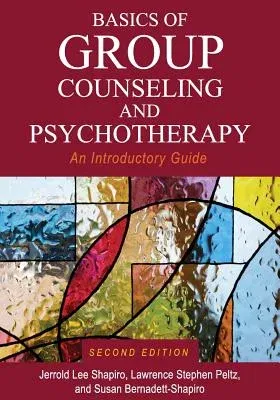Basics of Group Counseling and Psychotherapy: An Introductory Guide
provides a unique combination of step-by-step basics of group counseling
and psychotherapy and considerable depth of understanding of the
intricacies of group process. Students learn how to identify what is
going on in their groups, what interventions are most likely to be
effective, and when to make those interventions. The text provides
readers a competent and effective foundation for their study and
practice in group work.
The text is divided into three parts: The Core of Group process and
Leadership, Pragmatic Considerations, and The Future. Part I offers a
thorough introduction to brief, closed groups, guidance through four key
phases of group counseling and psychotherapy--preparation, transition,
treatment, and termination--and practical advice regarding leadership,
therapeutic interventions, the essentials of training, ethical
practices, and co-therapy. In Part II, the book dives into more advanced
material, specifically addressing how to work with clients with
difficult behaviors and offering the reader structured exercises and
techniques they can apply in groups. Part III provides a perspective on
the current state of group work and its future, touching on diversity,
training, research, and more.
Written by counselors and therapists who have conducted group counseling
and psychotherapy sessions for decades, Basics of Group Counseling and
Psychotherapy is an invaluable resource for individuals who are new to
group treatment and for those experienced group therapists looking for a
review.
Jerrold Lee Shapiro, Ph.D., is a professor of counseling psychology
at Santa Clara University, a retired licensed clinical psychologist, and
a Fellow of the American Psychological Association. He earned a B.A. at
Colby College, a master's degree from Northwestern University, and his
doctorate from the University of Waterloo. Dr. Shapiro has been leading
groups and studying group process for over fifty years. He has authored
and coauthored numerous publications within the field of psychology,
including 13 books, over 150 journal articles and book chapters, and
videos and software programs. He has won awards for teaching, writing,
and research and is a frequent presenter at professional conferences.
Lawrence Stephen Peltz, Ph.D., is a licensed marriage and family
therapist in private practice. He earned master's degrees in counseling
and guidance (University of Hawaii) and systems management (University
of Southern California), and his Ph.D. at the California Graduate School
of Family Psychology. Dr. Peltz has led a wide range of groups during
the past four decades and taught group psychotherapy at the graduate
level. In addition, he has experience in consultation to managing
business partners, developing software programs as adjuncts to
psychotherapy, and has served in the upper levels of professional
graduate school administration.
Susan Bernadett-Shapiro, Ph.D., is a clinical psychologist in
private practice, specializing in the use of cognitive and psychodynamic
approaches to help her clients attain goals and fulfill their potential.
After over thirty years, she recently retired from teaching in the
graduate master's program in counseling psychology at Santa Clara
University. Among her classes was the introductory group counseling
course and she also led groups and supervised the professional leaders
of experiential training groups. Dr. Bernadett-Shapiro earned her B.S in
nursing and master's degree in mental health nursing at the University
of Hawaii, and her doctorate in clinical psychology from the Pacific
Graduate School of Psychology.

